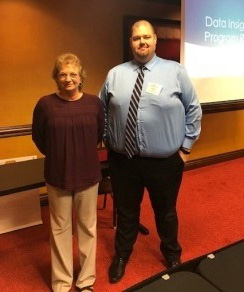At the annual Forum for Excellence, the premier professional development event for Illinois professionals in Career and Technical Education (CTE) and adult education, Dr. Ben Williams opened the conference centering on the importance of educational equity. As the chief executive officer of the National Alliance for Partnerships in Equity, Williams provided both state and national context for persistent and systemic inequalities in higher education and employment.
Sharing data from The Good Jobs Project of Georgetown University’s Center on Education and the Workforce, he highlighted the critical role of community colleges in advancing equity in a state identified as one of the top five in the nation for offering good jobs without a baccalaureate degree (Carnevale, Strohl, Cheah, & Ridley, 2017). As apprenticeship programs have gained national attention, Williams noted significant equity gaps for women and people of color, with Black workers being the lowest paid of all apprentices (Hanks, McGrew, & Zessoules, 2018).
Williams called on educators to lead with equity in mind to identify and address root causes and institutional barriers that are within their control and influence to change. The Comprehensive Local Needs Assessment (CLNA), required under the Perkins V law, was identified as an opportunity to do just that. The CLNA can be a powerful tool to leverage toward change to close equity gaps. While racial data is not collected at the federal level, Williams reminded practitioners that it is collected at the institutional level. As community colleges moved forward, they were encouraged to engage new stakeholders with intentionality and to be culturally responsive. This is especially relevant since Williams noted the role of the CLNA in driving institutional strategies to recruit and train high-quality CTE teachers who mirror student populations, in order to meet the projected needs associated with large numbers of retirements.
The Office of Community College Research and Leadership has been working closely with the Illinois Community College Board (ICCB) to draft the state’s CLNA template for community colleges. Given the race-neutral language of Perkins V, specific questions were incorporated surrounding racial equity (Welton, Rockey, & James-Gallaway, 2019). In order to provide support, OCCRL staff members presented a session at the Forum for Excellence on leveraging multiple tools available for CTE program improvement. These tools include the CLNA, the Program Review Illinois project, and Pathways to Results (PTR).
Kathy Swinson and Brandon Weger from Illinois Eastern Community Colleges (IECC) provided an example of PTR in practice. Their session featured IECC’s most recent PTR project that advanced their institution’s ability to extract and report disaggregated student data. For more information on their project, read this brief.
The Forum for Excellence is sponsored by ICCB and hosted by the Illinois Center for Specialized Professional Support (ICSPS), Southern Illinois Professional Development Center (SIPDC), and the Central Illinois Adult Education Service Center (CIAESC).
Photo taken by Marci Rockey with permission. Photo includes Illinois Eastern Community Colleges staff members, left to right, Kathy Swinson, the director of the Transition Center & Perkins, and Brandon Weger, the program director of Student Learning Assessment.
References
Carnevale, A. P., Strohl, J., Cheah, B., & Ridley, N. (2017). Good jobs that pay without a BA. Washington, DC: Georgetown University Center on Education and the Workforce.
Hanks, A., McGrew, A., & Zessoules, D. (2018, July 11). The apprenticeship wage and participation gap. Center for American Progress.
Welton, A. D., Rockey, M., & James-Gallaway, C. (2019). An equity-centered, comprehensive local needs assessment. Champaign, IL: Office of Community College Research and Leadership, University of Illinois at Urbana-Champaign.
